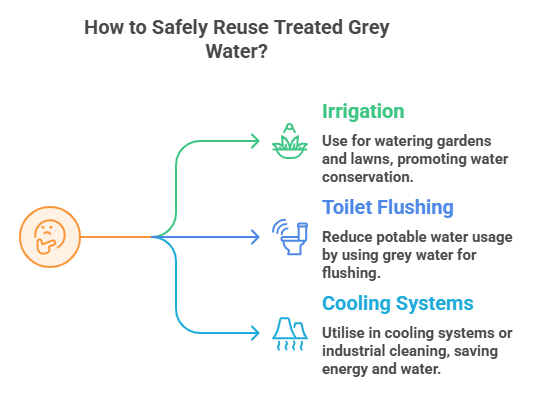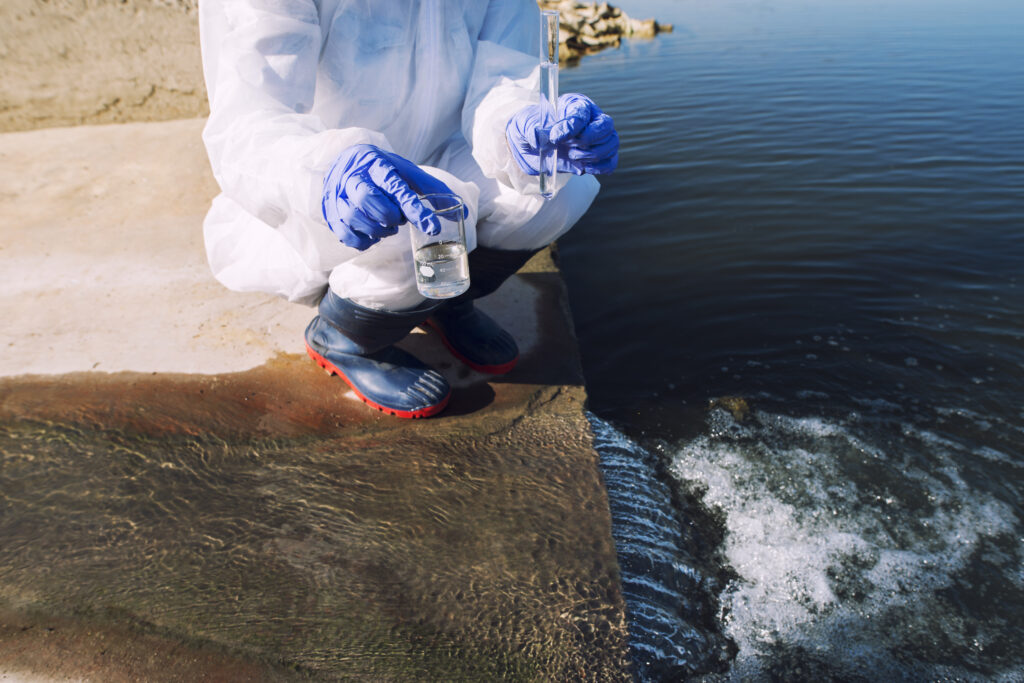Wastewater is generally divided into two major groups: black water and grey water. Although they are both wastewater, the contamination levels are different. Therefore, both of these wastewater types require particular treatment.
The treatment of black water and grey water is different because recycling wastewater is an eco-friendly solution. Grey water is comparatively cleaner than black water because it is produced from a non-toilet plumbing system. On the other hand, black water contains bio waste and pathogens that can harm overall health. Hence, knowing the difference between black water and grey water is important for determining their roles in water recycling.
Overview of Grey Water and Black Water
Both grey water and black water are contaminated water, which is treated to be reused to reduce the usage of essential freshwater resources. However, both of these are different in terms of the recycling process and their ability to contaminate freshwater sources.
What is in Grey Water?
Grey water is the water coming from showers, bathtubs, bathroom sinks, and laundry machines. In typical grey water, no human waste or organic waste is present, which makes it less contaminated than black water.
Generally, grey water contains soapy water, detergent, human hair, and small dirt and food particles, which are not highly contaminating. It is created from household sources like bathing showers, washing machines, and sinks.
Why is Recycling Grey Water Important?
Recycling grey water is a pragmatic and sustainable solution to reduce freshwater consumption. It is especially important in areas where water scarcity is high. Treated grey water can be used in instances like gardening, irrigation, toilet flushing, and industrial cleaning.
What is Black Water?
Black water is the most contaminated variation of wastewater. It contains human waste and organic particles coming from the toilet. Black water is highly contaminated because it carries:
- Fecal particles and urine
- Toilet paper
- Pathogens and detrimental microorganisms
- Greasy, oily food particles (Debris from kitchen sinks and dishwashers)
Due to the hazardous characteristics of black water, it cannot be treated easily like grey water. Therefore, treating blackwater requires more resources. Blackwater reprocessing includes benefits like:
- Minimising the untreated wastewater
- Recover nutrients and organic matter to be used as fertilisers or biogas.
Comparison Between Black vs Grey Water
Here are the key differences between black water and grey water, which are required to be known to protect the environment and avoid public health impact.
| Factors | Grey Water | Black Water |
|---|---|---|
| Source | Showers, sinks, and laundry | Toilet, kitchen sink, and dishwasher |
| Contaminants | Soap, detergents, skin particles, hair, and minor dirt. | Fecal matter, urine, harmful bacteria, food scraps, and grease. |
| Health Risks | Low if managed properly. | High risk of disease and contamination. |
| Treatment Complexity | Simple (Filtration and disinfection) | Complex (Multiple stages of advanced treatment) |
| Reusability | High (Important in irrigation and cleaning) | Limited (Toilet flush, and irrigation) |
| Environmental Impact | Reduces demand on freshwater, supports water conservation. | It can contaminate soil and groundwater if mishandled. |
| Installation and Maintenance Cost | Low-cost installation and maintenance. | Higher upfront cost. |
Table 1: The Difference Between Black vs. Grey Water
Why the Distinction Matters?
Now that we have understood the essential differences between grey water and black water treatment, let’s look at why the difference actually matters and how it is related to public health and the environment.
Public Health Concerns
Both grey water and black water can be detrimental to public health. The main reason to distinguish between black water vs grey water is to reduce contamination and diseases. Globally, in 2022, at least 1.7 billion people used feces-contaminated drinking water sources.
Polluted black water contains harmful pathogens such as E.coli and Salmonella. If not properly treated, this wastewater can contaminate soil and the adjacent water sources, which can result in significant health issues.
Environmental Protection
Another reason to be aware of the difference between these two wastewater sources is the importance of environmental protection. It is crucial to treat the wastewater before it mixes with the groundwater sources, which can contaminate the local reserve.
Reusability
If black water is properly treated, it can be reused in irrigation or toilet flushing. On the contrary, grey water is relatively easy to reuse, with very little treatment. Treating grey water separately helps to get clean water with less energy and resources used.
Safe Uses of Grey Water
Safely treated grey water can be reused in different ways. However, since it’s best for non-potable usages, grey water can never be used for drinking, cooking, or bathing. It is important to reuse grey water, maintaining the health guidelines. Here are some other applications of treated grey water.
- Irrigation for gardens and lawns
- Toilet flushing
- Cooling systems or industrial cleaning process

Risks of Mishandling Black Water
Black water contamination can damage your sewage system significantly. If the groundwater assessment is not done properly, the risks of contamination from black water will eventually increase. Here are the common risks that black water can cause:
Immediate Health Risks
Getting exposed to black water can lead to immediate health risks. Gastrointestinal risks such as severe diarrhea, stomachache, and vomiting can be observed. Besides, rashes and bacterial infections can appear on the skin if one comes in direct contact with contaminated black water.
Long-term Health Risks
If not properly treated, black water imposes long-term health risks like neurological dysfunction from heavy toxin particles affecting the nervous system. On top of that, an increased risk of chronic respiratory conditions can result in tenacious lung problems and weaken the body’s immune system.
Groundwater Contamination
Black water contaminants can mix with groundwater mainly through leaky septic tanks and improper disposal of black water. Disposal of blackwater on the surface can also lead to contaminated water seeping into the groundwater.
Black water can only be disposed of at selected sewage treatment plants or authorised dumping points.
Wrapping Up
Grey water is easily reusable with minimal treatment, while black water can not be used without getting fully treated. It is crucial to implement safe practices while properly recycling black and grey water. Greywater recycling offers a considerable cost-effective solution for domestic and industrial aspects, through which a significant amount of freshwater can be saved. On the other hand, blackwater recycling requires larger facilities and resources to fully recycle the contaminated water. Therefore, it is essential to understand the dissimilarities and choose the right system to conserve water for a better future of the planet.
Consult With Professionals for Water Testing and Responsible Handling of Wastewater!
Experiencing the issue of wastewater contamination? Prioritise consulting with experienced water testing service providers who can responsibly handle wastewater.
Frequently Asked Questions
Can I Use the Treated Grey Water in My Vegetable Garden?
Yes, you can use it in your vegetable garden. But make sure it is entirely treated and complies with the local health protocols. Untreated grey water should not be used for irrigation.
Can Black Water Result in Mould Growth?
Walls exposed to blackwater can result in mould within 24 to 48 hours if it is not properly treated. The black water contains organic waste that creates the best environment for mould growth.
How Much Water Can a Greywater-based Household Save Every Year?
Reusing grey water can help you reduce the tap water usage by 16 to 45 per cent. Reusing grey water can greatly conserve the groundwater resource.





